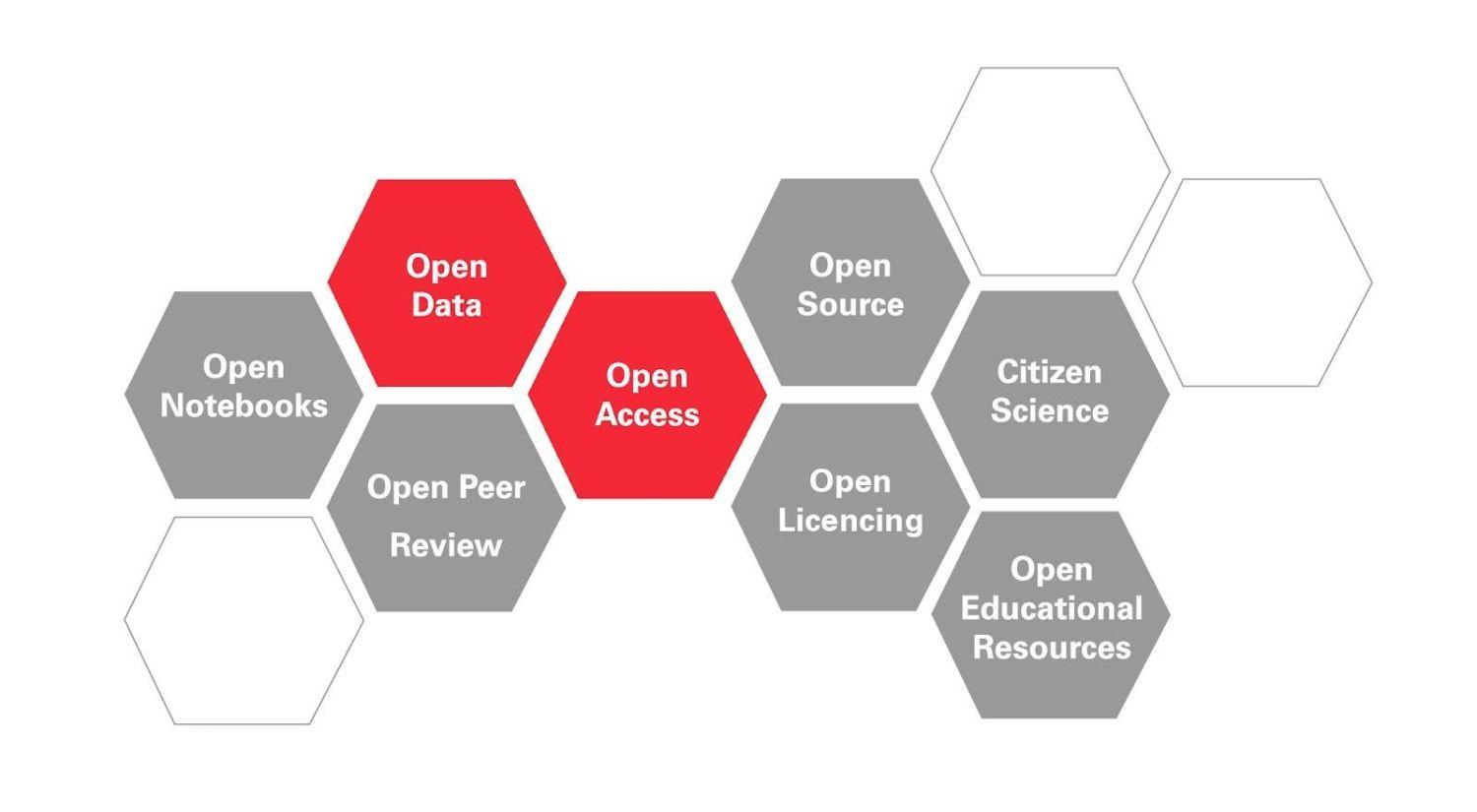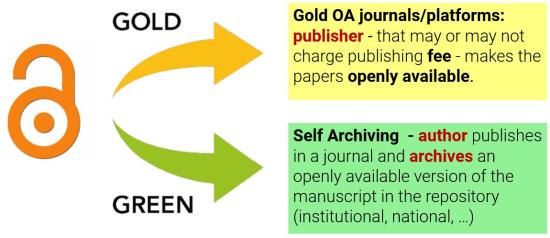About Open Science
Umbrella term for many principles and practices.
Open Science (OS) aims to facilitate collaboration between scientists and make it easier to disseminate knowledge. Nowadays, adherence to OS standards is a requirement in various projects, grants and - most importantly - it actually helps scientists themselves.

Open Science - umbrella term for many principles and practices
Benefits of Open Science
- Better accessibility of scientific results
- Improved efficiency and rapid dissemination
- Higher visibility for authors and institutions
- Increased economic and social impact
- Facilitates reproducibility
- Possibility of sharing & saving resources
The support and development of Open Science at UCT Prague
- The systematic support of open science is a priority area of the Strategic Plan of the University of Chemistry and Technology, Prague (UCT Prague).
- Preparation of the Open Science Strategy of UCT Prague is underway.
- The preparation and implementation of the Strategy are being addressed by the Coordination Team for Open Science established by the Rector in 2023.
- Informational support for Open Science on the web can be found at open.vscht.cz.
- Open publishing (Open Access, OA) is consistently supported at UCT Prague through a central OA fund.
- Methodological support for open access is provided by an OA coordinator and an OA administrator.
- Authors now have the opportunity to use so-called tokens for article processing charges (APCs) within transformative agreements negotiated by the National CzechElib Center.
- For long-term archiving and dissemination of research outputs, authors from UCT Prague can utilize the publicly available repository Zenodo, managed by CERN. Zenodo allows for the allocation of persistent identifiers and meets credibility requirements, including open access to metadata. UCT has established an institutional community on Zenodo, enabling metadata curation.
- Methodological support for research data management is provided by the university data management coordinator along with other data stewards supporting individual faculties.
- For planning research data management and creating Data Management Plans (DMPs), UCT Prague has access to an intuitive online tool, the Data Stewardship Wizard (DSW), under its own instance. DSW enables collaboration and the creation of DMPs, including their updating throughout the project.
- For storing and sharing research data in accordance with FAIR principles, it is advisable to use a data repository preferably within the disciplinary field or a general repository like Zenodo.
- In the future, the National Data Infrastructure and the utilization of services from the national repository platform are anticipated.
- UCT Prague is a member of the National ORCID Center Consortium and provides methodological support to authors at UCT Prague in establishing and managing ORCID profiles.
Open Science and the approach to science evaluation
In 2022, UCT Prague joined the international coalition CoARA to support the change in the evaluation of science. In this context, the system for evaluating science, scientists, and grants will take into account various outputs, processes, and activities that maximize the quality and impact of research, including the implementation of Open Science practices.
CoARA: 4 key commitments:
- Recognizing the diversity of scientific outputs, activities, and careers.
- Basing evaluations on qualitative assessments.
- Abandoning the inappropriate use of publication metrics.
- Avoiding the use of rankings of research organizations.
Open Access (OA)
Open access to research results means providing free and unrestricted online access to scientific information to end users, with the possibility of further reuse.
Open access to scientific publications
Examples of scientific publications
- Peer-reviewed scientific articles
- Conference contributions
- Monographs Chapters in specialized books
- Articles in proceedings
- Methodologies Therapeutic and heritage procedures
- Specialized maps with expert content
- Comprehensive research reports
- Textbook and commentary publications containing scientific information
Other scientific outputs related to publications (such as original research results, research data, software, source code, source materials, working procedures and protocols, digital representations of images and graphical materials, and scientific multimedia materials) that are openly licensed or dedicated to the public should be deposited in a suitable open repository that allows for their proper linkage with publications.
Permission for further re-use of content is granted through so-called open licenses (see Open license below).
Closed Access vs Gold/Green Open Access
Closed Access (behind the paywall)
Traditional model: Institutions/libraries/consortia pay subscriptions for journals.
- Access to publications is restricted to members (students/employees) of the institution.
- Access is charged for non-members.
Open Access - routes
There are various routes to ensure Open Access to publications.

Two main routes OA publications routes: Gold and Green
Green OA
- Authors publish their work in a subscription journal and then self-archive a version of the manuscript in a repository.
- There is no cost for authors, but publishers typically require the publication (or one of its versions) to be made available only after a specified embargo period (usually between 6 to 24 months).
- More information on publishers' policies regarding (self)archiving is provided by Sherpa/RoMEO.
- Institutional repositories are most commonly used for publications. More information about OA repositories is available in the Directory of Open Access Repositories (OpenDOAR).
Gold OA
- This allows immediate OA to publications upon their release on the publisher's website.
- However, it is often associated with a fee for article processing (known as APC, Article Processing Charge).
- APCs are typically covered by authors (e.g. from grants) or through their institution (e.g. from an OA fund/tokens).
Where No costs for OA publishing is required from authors/institutions, because it is covered directly by publisher/professional society, it is commonly known as Diamond OA (a sub-variant of the gold route).
ATTENTION: Retain sufficient intellectual property rights (IPR) to comply with OA obligations.
- Copyright: Typically, when researchers publish their work, copyright can either be transferred to the publisher or retained by the authors. Retaining copyright allows authors more control over how their work is shared and reused.
- Licenses: Authors can retain copyright and grant publishers a license to publish the work. Common licenses used in OA include Creative Commons (CC) licenses, which allow various levels of reuse and distribution.
- Retaining sufficient rights: Researchers need to be aware of their OA obligations and ensure they retain sufficient rights to comply with these requirements. This might involve negotiating terms with publishers or choosing journals that support the required level of access.
- It is recommended that authors/institutions do not transfer IPRs, but instead grant the publisher only a license necessary for publication, preserving the author/institution's ability to publish the work under open licenses.
Open vs. FAIR Data
Open research data should be available promptly and in a user-friendly, machine-readable, and human-readable format, following the principles of FAIR (Findable, Accessible, Interoperable, and Reusable).
FAIR Data ≠ Open Data
Even though one of the conditions of FAIR data is their accessibility, it does not mean that they must be open and accessible to anyone.
Access to scientific data should be "as open as possible".
As open as possible, as closed as necessary, but sometimes it may be necessary to restrict access. There may be legitimate reasons to protect the created data, such as situations where the dataset contains personal information or national security data, or where data publication would hinder subsequent commercialization of research results.
Open Access to research data and metadata is typically implemented through data repositories.
Legislation
The obligation to ensure effective management of research data according to FAIR principles is part of European legislation (European Directive 2019/1024, Article 10 on research data) and has been incorporated into national legislation since 2022 (Act No. 130/2002 Coll.).
Law No. 130/2002 Coll., on the Support of Research, Experimental Development, and Innovation from Public Funds
Section 9: Regulation of Relations between Provider and Recipient
(1) The provider shall conclude with the recipient a specific support agreement for a project under Section 3(2) regarding the provision of support...
The contract must contain at least:
- (l) the method of research data management,
- (m) information on the availability and dissemination of research results and research data, if created with the support of public funds under this law, following the principle that research results and research data are not published only in justified cases...
Open Source
Open source entails documenting and freely sharing the software used in research activities, including source code, and possibly hardware designs. In the context of Open Science, where open source code is part of the research process, enabling reuse and replication typically requires that the source code be accompanied by open data and specifications of the environment needed for its creation and execution.
Open Licence
Open/public licenses grant others the right to use works protected by copyright law and, depending on the type of public license, to modify, distribute, and create derivative works, and even use them for commercial purposes. Creative Commons (CC) licenses are most commonly used for publications and data. By providing a CC license, the author or rights holder grants these rights to other users under certain conditions.
Types of Creative Commons Licences
They can vary for different types of publications.
For scientific articles and data.
Default recommendation is:
- CC BY (4.0) license - allowing others to access, extract, use, distribute, and reproduce the research work and data, including derivative works. The only requirement is attribution to the author.
For monographs and other long texts (such as a chapter in a book), the license may exclude commercial use and derivative works.
- CC BY-NC
- CC BY-ND
- CC BY-NC-ND
The tool for selecting CC licenses
According to the following steps, select an appropriate license for your work:
Open Peer Review
Open peer review is a mechanism that, at a certain stage of the peer review or publication process, publishes peer reviews and/or the identities of reviewers. It's an alternative method aiming to make traditional "blind" or "closed" peer review more transparent and accountable.
Open Methodology
Open methodology involves sharing all methodological details of studies and all tools used for data collection and analysis, including preregistration of studies and so-called open science journals.
Preregistration
An approach where the research plan and methodology are publicly shared even before the research commences, for example, by submitting it to a registry.
Open notebooks
Open (laboratory) notebooks provide access to and sharing of records from a research project.
Open Infrastructure
Open infrastructure refers to shared research infrastructures (virtual or physical) needed to support science and serve the needs of various communities. Open scientific infrastructures are often the result of community-building efforts, which are key to their long-term sustainability.
Open scientific infrastructures
They may include, for example:
- significant scientific equipment or systems of instruments
- knowledge resources, collections
- repositories, archives, and scientific data
- information systems for research results analysis and evaluation
- computing services and data processing services
- digital infrastructures, virtual research environments, and digital research services; open laboratories
- repositories for publications, research data, and source code.
Repositories for scientific publications, data, and other outputs
- A repository is an information system/digital archive designed for the long-term preservation and dissemination of digital objects (research outputs), ensuring storage, protection, integrity, authenticity, and access to digital objects over the long term.
- Repositories (institutional, subject-based, multidisciplinary, general) are used for storing and providing open access to scientific publications, data, and other research outputs.
Testing and experimental infrastructures
- They consist of facilities, equipment, capacities, resources, and related services used to support testing, conducting experiments, and verifying functionality for the purpose of developing new or improved products, services, or procedures, testing innovative technologies, and transferring knowledge or PR.
Large research infrastructures
- They represent unique facilities essential for research, development, and innovation activities with high knowledge and technological requirements:
- Operated by research organizations in the Czech Republic, possibly in cooperation with the Czech Republic abroad.
- Accessible on the principle of open access policy to all interested parties for research and development purposes.
- In relevant fields: Physical sciences and engineering, Energy, Environmental sciences, Health and food/biological and medical sciences, Social and humanities sciences, e-Infrastructure.
Open education resources include teaching, study, and research materials that are publicly available, and their subsequent use (i.e., modification and further distribution by others) is permitted without restrictions or with partial restrictions through Creative Commons public licenses.
Citizen Science and community engagement
Citizen science aims to involve volunteers from the public in the scientific process, which may include formulating research questions, conducting scientific experiments, collecting and analyzing data, interpreting results, making new discoveries, contributing to the development of technologies and applications, and addressing complex problems.
For example, NASA's citizen science projects represent collaboration between scientists and members of the public.
Societal engagement means expanding collaboration between scientists and societal actors outside the scientific community. This involves involving citizens and communities in knowledge creation and strengthening dialogue between scientists, policymakers, practitioners, entrepreneurs, community members, and other stakeholders.







